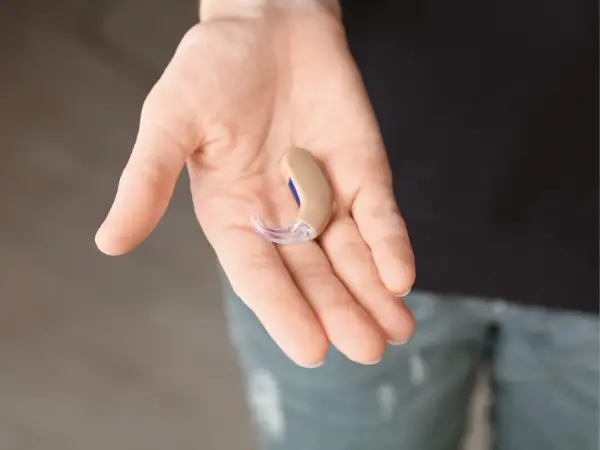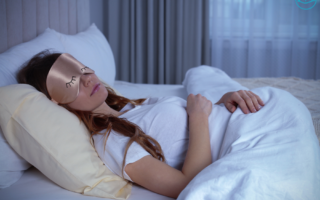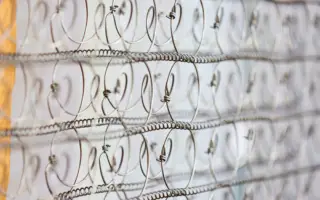It is not recommended to sleep with hearing aids. They can cause discomfort and potential damage.
Many people wonder if they can sleep in their hearing aids for convenience. Wearing hearing aids while sleeping is not advisable due to several reasons. Sleeping with them can lead to discomfort, potential ear infections, and damage to the device itself.
Your ears need a break from the constant presence of the aids to avoid irritation. Proper care and maintenance of your hearing aids include taking them out before bed. This practice ensures the longevity of the device and the health of your ears. Always consult with your audiologist for personalized advice on hearing aid use.
Sleeping With Hearing Aids
Have you ever wondered, can you sleep in hearing aids? For many people, hearing aids are a vital part of daily life. But the question of whether or not you can sleep with them is common. This blog will explore the benefits and concerns of sleeping with hearing aids.
Sleeping with hearing aids can offer several benefits that may enhance your overall well-being. Here are some of the key advantages:
- Improved Awareness: You can be more aware of sounds around you, such as alarms or crying children.
- Continuous Hearing: You won’t miss out on important sounds during the night.
- Safety: Enhanced awareness of your surroundings can improve your safety.
Here is a table summarizing these benefits:
| Benefit | Description |
|---|---|
| Improved Awareness | Hear alarms and other important sounds. |
| Continuous Hearing | No need to remove and reinsert hearing aids. |
| Safety | Increased awareness of surroundings. |
While there are benefits, there are also concerns about sleeping with hearing aids. These concerns can affect your comfort and the longevity of your hearing aids:
- Comfort: Hearing aids may cause discomfort or pain when sleeping.
- Damage Risk: They can get damaged from pressure or moisture.
- Battery Life: Continuous use can drain batteries quickly.
Consider these factors before deciding to sleep with hearing aids:
- Check with your audiologist for personalized advice.
- Use a dehumidifier to keep hearing aids dry.
- Consider softer ear molds for increased comfort.
Understanding both the benefits and concerns can help you make an informed decision about sleeping with hearing aids.
Benefits Of Sleeping With Hearing Aids
Find Out: Can You Sleep in Hearing Aids? Many people with hearing loss wonder if they can sleep with their hearing aids in. While there are pros and cons, understanding the benefits of sleeping with hearing aids can help you make an informed decision. Let’s explore how sleeping with hearing aids can improve communication, enhance safety, and lead to better sleep quality.
Improved Communication
Sleeping with hearing aids can lead to better communication with your partner or family members. Here’s how:
- Nighttime Conversations: You won’t miss out on important discussions before bed.
- Emergency Situations: Hear alarms or calls for help clearly.
- Morning Wake-Up: Engage in conversations immediately upon waking.
For couples, this can be particularly important. Imagine being able to hear your partner’s voice without any struggle. This can strengthen your relationship and make nighttime conversations more enjoyable.
A study published in the Journal of Speech, Language, and Hearing Research found that consistent hearing aid use improves overall communication, even during off-peak hours. For parents, hearing aids can be crucial for monitoring children at night.
Here’s a quick comparison of scenarios:
| Without Hearing Aids | With Hearing Aids |
|---|---|
| Missed conversations | Engaged interactions |
| Unheard alarms | Immediate response |
| Communication delays | Instant communication |
Enhanced Safety
Wearing hearing aids while sleeping can significantly enhance safety. Let’s look at some key points:
- Fire Alarms: Hear smoke detectors and fire alarms clearly.
- Intruder Alerts: Be alert to unusual noises or potential threats.
- Medical Emergencies: Respond to health-related alarms or calls for help.
In emergency situations, every second counts. Hearing aids ensure you don’t miss critical alerts. For elderly individuals or those with medical conditions, this added layer of safety can be life-saving.
A survey by the American Academy of Audiology revealed that over 70% of hearing aid users felt more secure knowing they could hear alarms and alerts at night.
Consider this table for a better understanding:
| Scenario | Risk Without Hearing Aids | Benefit With Hearing Aids |
|---|---|---|
| Fire | Delayed response | Immediate action |
| Intruder | Unaware of threat | Quick alertness |
| Medical emergency | Missed alerts | Timely response |
Better Sleep Quality
Surprisingly, sleeping with hearing aids can lead to better sleep quality. Here’s why:
- Consistent Sound Environment: No abrupt changes in noise levels.
- Reduced Anxiety: Feel secure knowing you won’t miss important sounds.
- Improved Comfort: Modern hearing aids are designed for all-day wear.
Some users report that hearing aids help them stay in tune with their environment, reducing the likelihood of sudden awakenings due to unfamiliar sounds. This consistent auditory input can make falling and staying asleep easier.
According to a study in the Journal of Clinical Sleep Medicine, individuals who wore hearing aids experienced fewer sleep disturbances compared to those who didn’t.
Here’s a breakdown of the benefits:
| Without Hearing Aids | With Hearing Aids |
|---|---|
| Inconsistent sound levels | Stable auditory environment |
| Higher anxiety | Reduced stress |
| More awakenings | Deeper sleep |

Concerns About Sleeping With Hearing Aids
Many people rely on hearing aids to improve their quality of life. But can you sleep with them? There are several concerns about sleeping with hearing aids, ranging from discomfort and irritation to the risk of damaging the devices and battery life issues. Let’s explore these concerns in more detail.
Discomfort And Irritation
Sleeping with hearing aids can cause discomfort and irritation. The devices can press against your ear, causing pain. Here are some common issues:
- Pressure Points: The hearing aid can create pressure points, making it hard to sleep comfortably.
- Skin Irritation: Prolonged use can irritate the skin in and around your ear.
- Noise: Hearing aids might amplify background noises, disrupting your sleep.
Many users report waking up multiple times due to these issues. Here are some tips to reduce discomfort:
- Use a softer pillow to reduce pressure.
- Ensure the hearing aid is clean to avoid skin irritation.
- Consider using a white noise machine to mask background noises.
Below is a table summarizing the common causes of discomfort and possible solutions:
| Cause | Solution |
|---|---|
| Pressure Points | Softer Pillow |
| Skin Irritation | Clean Hearing Aid |
| Noise | White Noise Machine |
Risk Of Damaging The Hearing Aids
Sleeping with hearing aids poses a risk of damaging the devices. These risks include:
- Physical Damage: Rolling over can cause the hearing aids to break.
- Moisture Exposure: Sweat can damage the internal components.
- Displacement: The hearing aids can fall out and get lost.
To minimize these risks:
- Place the hearing aids in a protective case when not in use.
- Use a dehumidifier to keep them dry.
- Check for any loose parts regularly.
Here’s a table showing common risks and preventative measures:
| Risk | Preventative Measure |
|---|---|
| Physical Damage | Protective Case |
| Moisture Exposure | Dehumidifier |
| Displacement | Regular Checks |
Battery Life
Another concern is the impact on battery life. Hearing aids running overnight can drain their batteries quickly. Here are some points to consider:
- Frequent Charging: You may need to charge the batteries more often.
- Replacement Costs: Constant use can lead to frequent battery replacements.
- Reduced Efficiency: Running the batteries down can make them less efficient over time.
To manage battery life:
- Turn off the hearing aids when not needed.
- Invest in rechargeable batteries.
- Keep spare batteries handy.
Here’s a table summarizing battery life concerns and solutions:
| Concern | Solution |
|---|---|
| Frequent Charging | Turn Off When Not Needed |
| Replacement Costs | Use Rechargeable Batteries |
| Reduced Efficiency | Keep Spares Handy |
Tips For Sleeping With Hearing Aids
Many people wonder, “Can you sleep in hearing aids?” While it’s not always recommended, some situations might call for it. If you need to wear your hearing aids to bed, following a few tips can make the experience more comfortable. Here are some essential tips for sleeping with hearing aids.
Choose Comfortable Hearing Aids
Choosing the right hearing aids is crucial for a good night’s sleep. Not all hearing aids are designed for overnight wear. Look for hearing aids that are lightweight and have a snug fit. Some features to consider include:
- Soft Ear Tips: Soft ear tips are gentle on your ears and reduce discomfort.
- Small Size: Smaller hearing aids are less intrusive and less likely to cause pressure points.
- Custom Fit: Custom-fitted hearing aids provide a more secure and comfortable fit.
If you’re unsure which type to choose, consult your audiologist. They can recommend the best options based on your needs and preferences.
Take Proper Care Of Hearing Aids
Proper care of your hearing aids extends their lifespan and maintains their performance. Before going to bed, ensure your hearing aids are clean and functioning well. Here are some maintenance tips:
- Clean Regularly: Use a soft, dry cloth to clean your hearing aids daily.
- Check Batteries: Ensure your batteries are charged or replaced if needed.
- Store Safely: If you decide not to wear them, store your hearing aids in a dry, cool place.
Proper care not only improves comfort but also enhances the durability of your hearing aids.
Adjust Volume And Settings
Adjusting the volume and settings can make a big difference. High volume levels can cause discomfort and even damage your hearing. To ensure a restful sleep, consider the following adjustments:
- Lower the Volume: Reduce the volume to a comfortable level that won’t disturb your sleep.
- Use Sleep Mode: Some hearing aids have a sleep mode that minimizes background noise.
- Consult Your Audiologist: They can help you fine-tune the settings for optimal comfort.
These small adjustments can help you achieve a better night’s sleep.
Consider Using Sleep Accessories
Sleep accessories can enhance your comfort while wearing hearing aids. These accessories can help you sleep better and protect your hearing aids. Some useful accessories include:
- Pillow Speakers: These allow you to listen to sound without disturbing your partner.
- Protective Covers: Covers can protect your hearing aids from moisture and dirt.
- Special Pillows: Some pillows have a cut-out design to accommodate hearing aids.
Using the right accessories can significantly improve your sleeping experience with hearing aids.
Alternatives To Sleeping With Hearing Aids
Are you wondering if you can sleep with hearing aids? You might find them uncomfortable or even risky to wear overnight. Luckily, there are several alternatives to sleeping with hearing aids. These options can help you maintain good hearing health and ensure a restful night.
Using Pillow Speakers
Pillow speakers are small speakers that fit under your pillow. They provide clear sound without disturbing others. This can be a great alternative to wearing hearing aids at night.
Here are some benefits of using pillow speakers:
- Comfort: No need to wear anything in your ears.
- Sound Quality: Clear and adjustable sound levels.
- Privacy: Only you can hear the sound, not others in the room.
Pillow speakers come in various designs and features. You can find wired or wireless options, and some even have Bluetooth connectivity. Here’s a comparison table of popular pillow speakers:
| Model | Type | Features | Price Range |
|---|---|---|---|
| Sound Oasis SP-101 | Wired | Volume control, high-quality sound | $20 – $30 |
| SleepPhones Wireless | Wireless | Bluetooth, washable headband | $100 – $120 |
| C Crane PS2 | Wired | Compact design, clear audio | $30 – $40 |
Using Vibrating Alarm Clocks
Vibrating alarm clocks are perfect for those who cannot hear traditional alarms. They wake you up by vibrating instead of making noise. This ensures you wake up on time without needing hearing aids.
Advantages of vibrating alarm clocks include:
- Effective: Vibration ensures you wake up even if you can’t hear.
- Silent: Won’t disturb others in the room.
- Versatile: Many models offer both sound and vibration options.
Some popular vibrating alarm clocks include:
| Model | Type | Features | Price Range |
|---|---|---|---|
| Sonic Bomb | Vibration & Sound | Extra loud, bed shaker | $30 – $40 |
| ShakeAwake | Vibration Only | Compact, battery-operated | $25 – $35 |
| iLuv TimeShaker | Vibration & Sound | Bluetooth, USB charging | $50 – $60 |
Exploring Other Assistive Listening Devices
Other assistive listening devices can help you hear better without wearing hearing aids at night. These devices include personal amplifiers, TV listening systems, and phone amplifiers.
Benefits of these devices are:
- Flexibility: Use them as needed without keeping them on all night.
- Enhanced Hearing: Improve sound quality for specific activities.
- Convenience: Easy to use and set up.
Here are some examples of assistive listening devices:
| Device | Type | Features | Price Range |
|---|---|---|---|
| Pocketalker Ultra | Personal Amplifier | Adjustable volume, lightweight | $120 – $140 |
| TV Ears | TV Listening System | Wireless, clear sound | $100 – $130 |
| Clarity XLC3.4 | Phone Amplifier | Extra loud, easy to use | $80 – $100 |
Choosing the right assistive listening device depends on your specific needs. These alternatives can help you sleep better and still enjoy clear sound without wearing hearing aids overnight.
Consulting With An Audiologist
If you wear hearing aids, you might wonder, “Can you sleep in hearing aids?” It’s a common question for many users. While hearing aids help you hear better during the day, they might not be comfortable at night. Consulting with an audiologist can provide insights and recommendations tailored to your needs. Let’s dive into the key areas to discuss with your audiologist to ensure a restful night’s sleep.
Discussing Sleep Concerns
When discussing sleep concerns with your audiologist, it’s important to share specific details about your experience. Here are some points to cover:
- Comfort Issues: Do your hearing aids feel uncomfortable or cause pain when lying down?
- Noise Interference: Do you hear unwanted noises or feedback while trying to sleep?
- Sleep Position: Do you sleep on your side, back, or stomach? Your position can affect hearing aid comfort.
- Sleep Quality: Have you noticed a difference in sleep quality since wearing hearing aids at night?
Comfort issues are common. The design of your hearing aids may not be suitable for nighttime wear. Discussing these problems can help your audiologist understand your needs better.
Sometimes, hearing aids can produce noise interference such as feedback or static. This can disrupt sleep and cause frustration. Your audiologist can adjust settings to minimize these issues.
Another factor is your sleep position. Different sleep positions can apply pressure on your hearing aids, causing discomfort. Your audiologist might recommend specific types of hearing aids that are better suited for your sleep habits.
Lastly, track your sleep quality. Share any changes in your sleep patterns with your audiologist. They can suggest modifications to your hearing aids or alternative solutions to improve your sleep.
Exploring Customized Solutions
After discussing your sleep concerns, your audiologist can help you explore customized solutions. Here are some options they might suggest:
- Custom-Fit Hearing Aids: These are designed to fit the unique shape of your ear, providing increased comfort.
- Soft Ear Molds: These molds are made from softer materials, reducing pressure and discomfort while sleeping.
- Nighttime Settings: Your audiologist can program special settings for nighttime use, reducing noise interference.
- Alternative Devices: Consider using white noise machines or sound pillows instead of hearing aids at night.
Custom-fit hearing aids offer a tailored fit, ensuring they stay in place and remain comfortable. This can significantly improve your sleep experience.
Soft ear molds are another excellent option. Made from soft materials, these molds reduce pressure on your ear, making them ideal for side sleepers.
Discussing nighttime settings with your audiologist can lead to adjustments that minimize unwanted noise. These settings are designed to provide a quieter experience, helping you fall asleep more easily.
If hearing aids prove too uncomfortable, your audiologist might suggest alternative devices like white noise machines or sound pillows. These can help mask background noise without the need for hearing aids.
By exploring these customized solutions, you can find the best option for your needs, ensuring a comfortable and restful night’s sleep.
Frequently Asked Questions
Is It Okay To Sleep In Your Hearing Aids?
Sleeping in your hearing aids is not recommended as it can cause discomfort and potential damage. It is best to remove them before going to bed.
Is It Okay To Wear Hearing Aids 24 Hours A Day?
Wearing hearing aids 24 hours a day is not recommended. Remove them while sleeping to let your ears rest.
When Should Hearing Aids Be Removed?
Remove hearing aids before showering, swimming, or sleeping. Avoid exposure to water and moisture. Take them off during loud events.
Can You Sleep While Hearing?
Yes, you can sleep while hearing. The brain still processes sounds during sleep. Loud or sudden noises may wake you.
Conclusion
Sleeping in hearing aids depends on personal comfort and your specific hearing aid model. Consult your audiologist for personalized advice. Experiment with different solutions to find what works best. Prioritize your comfort and sleep quality to maintain overall health. Remember, proper hearing aid care ensures their longevity and effectiveness.



